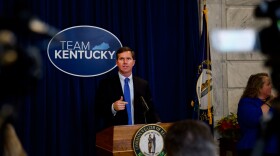Thirty-two new cases of COVID-19 are being reported at Ford’s Kentucky Truck Plant (KTP) on Chamberlain Lane in Louisville.
A memo sent to United Auto Workers union members on Thursday announced the new cases at the facility. The latest round of positive cases brings KTP’s total to 52 cases since March. The plant employs 8,900 workers who assemble the Ford Expedition, Ford Super Duty trucks and the Lincoln Navigator.
UAW Local 862 President Todd Dunn said the rise in cases occurred following Ford’s annual shutdown. Each year, the plant shuts down for one to two weeks to allow equipment to be retooled and repaired.
Employees usually use this time for vacations, Dunn said. He suspects travel played a role in the increase in positive cases.
“It’s the normal vacation everybody looks forward to, whether we're going to Florida or you name it, it doesn't matter,” he said. “I think [the shutdown played a role] just out of the sheer numbers and the travel. I mean, it was somewhat expected, I think, by everybody.”
Another 25 cases are being reported in a separate Ford operation, the Louisville Assembly Plant, which employs 4,100 people, according to Dunn.
A statement from Ford said that despite the new cases, the company believes its safety protocols are effective.
“Our plants are a reflection of the communities in which they are located,” said manufacturing and labor communications manager Kelli Felker. “Working closely with the UAW and external experts in infectious disease and epidemiology, we developed safety protocols to help stop the spread of COVID-19 in the workplace, which we follow at all Ford facilities globally."
"While we are aware of employees who have tested positive for COVID-19, no one identified as a close contact who was following our protocols has developed symptoms or tested positive for the virus. This indicates our workplace safety protocols are working.”
Even before the release of the new case numbers on Thursday, workers at the Kentucky Truck Plant were expressing concerns about steps Ford takes to prevent the spread of the coronavirus.
WFPL spoke with three KTP employees about conditions at the plant. WFPL agreed to not publish their names because the workers said they feared losing their jobs for speaking to a reporter.
Some of those employees disagreed with the steps that Ford takes when a positive case is identified. They said that while the “Return to Work Playbook” is frequently updated, in some cases new policies are more relaxed than measures that were put in place at the beginning of the pandemic in March.
Initially, a positive test was supposed to lead to the plant being shut down for 24 hours for deep cleaning.
The most recent playbook, which was last updated on July 30 calls for impacted areas, like the infected employee’s workstation, to be isolated with caution tape until the janitorial team can clean it.
“Right when we came back it was...shut down for 24 hours if we get a positive case,” one worker said. “But the second we got that first positive case, nothing happened. There was no shutdown. They would shut down the line in that area and do spot cleaning, which is just cleaning that person's [workspace], and that’s it.”
Those who are deemed to have had close contact with an infected employee — which the playbook defines as being within six feet for 15 minutes or longer — are informed by plant officials during contact tracing. Close contacts are asked to stay home and monitor symptoms for 14 days from the date of possible exposure.
Employees in some departments work close to one another, with coworkers assigned to each side and directly across from them, as vehicle components are passed down the facility’s conveyor belts.
“Out there in trim and other departments, you're working within six feet for 11 hours,” one employee said. “You’re working in such close proximity that it'd be everybody on the team, and everybody on the line [in close contact].”
Though masks are required, the employees said their coworkers frequently fail to comply. The employees who spoke to WFPL reported that they estimate only roughly half of their coworkers properly wear a mask throughout the day.
“A good amount of people, I would say at least half the people, at least have their nose out,” the employee said. “And by the end of the night, their mask is down around their chin. We did go to a union meeting, and they said that they're going to start cracking down on that.”
The UAW’s Dunn said he believes the union and company have stepped up to enhance contact tracing efforts and to work through employee concerns in the wake of the recent cases.
“We tried to work through those issues,” he said. “So I just thought on every level, we've been doing something more so than we have previously.”






